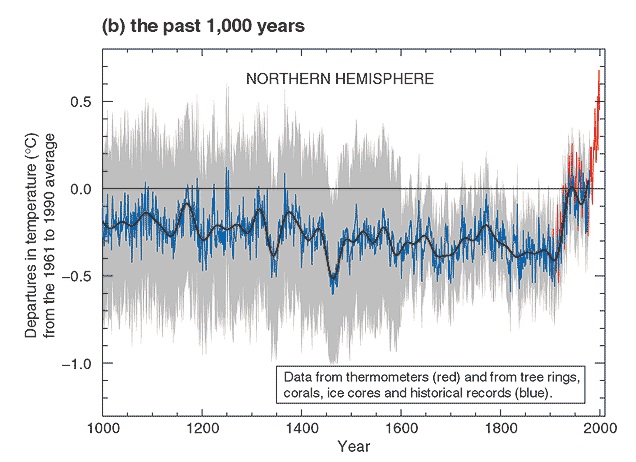Put up your hand if you’ve been a follower of news about climate change in recent years and haven’t heard of the “hockey stick” graph.
Nobody? No, didn’t think so.
These graphs get their name because of their shape.
They are reconstructions of the temperatures on Earth over several centuries to several millennia and they all have a repetitive tendency to turn sharply skyward showing the recent rapid warming of the Earth.
The most famous and first “hockey stick” came from research in the journal Nature in 1998 led by Professor Michael Mann, then of the University of Massachusetts Amherst.
Mann used historical data from tree rings and ice cores – known as “proxy records” – to determine what temperatures were like over the Northern Hemisphere over the 600 years or so before we had a reasonably well-dispersed network of thermometers.
When plotted on a chart… well, you know the rest. It looked like a hockey stick.
Mann followed up that work in 1999, refining the research for a study in Geophysical Research Letters to give a full 1000-year history of the planet’s temperatures.
His work appeared in the 2001 United Nations Intergovernmental Panel on Climate Change report. This is what it looked liked in that report (notice the red and blue colors – we’ll come to that in a bit.)
Since then, several other studies using different methodologies and different sets of data have come to broadly the same conclusion to Mann. Recent decades have been exceptionally warm.
Over the same period, climate science “sceptics” and denialists have been gunning for Mann, now the head of the Earth System Science Center at Penn State University.
He’s written a whole book about it, fittingly titled The Hockey Stick and the Climate Wars.
His opponents constantly raise allegations against Mann, without ever mentioning the half dozen or so investigations into his academic work and conduct that have concluded his work and conduct to be sound.
In July 2012, the Competitive Enterprise Institute published a particularly egregious article comparing Mann to a child molester who had “molested and tortured data”.
Conservative polemicist Mark Steyn, in a blog post for National Review Online, reproduced some of the comments and described Mann’s hockey stick graph as “fraudulent”. This is the same National Review that once wrote a begging letter to a US Senator in the hope he could pull some strings with the tobacco industry to get them to take out more advertising.
Mann asked for an apology and a retraction but was told in a headline to “Get Lost”. In October 2012, Mann issued a defamation lawsuit.
Climate Science Watch has been following the proceedings, but the latest installment comes this week.
The defendants have lodged a document to the court in the District of Columbia to appeal a previous decision not to throw Mann’s case out under Anti-SLAPP laws in the District of Columbia. These laws are designed to allow people to take advocacy positions on matters of public interest.
The filing repeats a series of well-thumbed allegations and criticisms that have been levelled at Mann and his colleagues over the years, while ignoring the conclusions of the investigations into those same accusations.
For example, the filing uses a quote from Professor David Hand taken from a report in The Daily Telegraph newspaper of a 2010 press conference.
The press conference was to announce the conclusions of a review into the illegal hacking and publishing of emails and other files from the University of East Anglia in November 2009.
That’s right, we’re still dredging up “Climategate”.
The court filing quotes Hand as saying that Mann’s technique had “exaggerated the size of the blade at the end of the hockey stick”.
Yet the defendants’ lawyers don’t mention that this statement was later clarified by the same Lord Oxburgh review – the one that concluded there was “no evidence of any deliberate scientific malpractice” in relation to the hacked emails. Here’s the clarification:
For the avoidance of misunderstanding in the light of various press stories, it is important to be clear that the neither the panel report nor the press briefing intended to imply that any research group in the field of climate change had been deliberately misleading in any of their analyses or intentionally exaggerated their findings. Rather, the aim was to draw attention to the complexity of statistics in this field, and the need to use the best possible methods.
The filing recites old criticisms of the statistical techniques and the use of proxy records without mentioning that the US National Research Council conducted a major review into these techniques almost a decade ago, in light of the criticisms being flung at Mann and his contemporaries. This is old territory.
The National Research Council committee report found:
The basic conclusion of Mann et al. (1998, 1999) was that the late 20th century warmth in the Northern Hemisphere was unprecedented during at least the last 1,000 years. This conclusion has subsequently been supported by an array of evidence that includes both additional large-scale surface temperature reconstructions and pronounced changes in a variety of local proxy indicators, such as melting on ice caps and the retreat of glaciers around the world.
A statement from the NRC added:
The committee pointed out that surface temperature reconstructions for periods before the Industrial Revolution – when levels of atmospheric greenhouse gases were much lower – are only one of multiple lines of evidence supporting the conclusion that current warming is occurring in response to human activities, and they are not the primary evidence.
The filing again quotes some of the emails from the “Climategate” hacking to try and create the impression that Mann had acted improperly, without mentioning the conclusions of the three reviews into the affair.
Two of those reviews were commissioned by the University of East Anglia and a third was conducted by a UK Parliamentary Committee. A separate inquiry carried out by Penn State into Mann’s conduct also cleared him of allegations of research misconduct.
Another allegation in the court document is that “the hockey stick is misleading because it splices together two different types of data without highlighting the change [from proxy records to actual temperature observations].”
The roots of this claim were examined by the Independent Climate Change Emails Review and which involved one instance of Mann’s data being presented alongside other research in a chart on the cover of a 1999 World Meteorological Organization report.
Yet in the most high profile representations of Mann’s chart (in Nature, Geophysical Research Letters and the IPCC 2001 report) the colours and the legends beside the charts clearly show which data points refer to proxy records and which refer to temperature observations.
The case – and the dosing of half-truths – continues.
Subscribe to our newsletter
Stay up to date with DeSmog news and alerts








